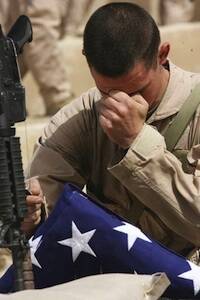Nancy Sherman returns to the subject of veterans with post traumatic stress disorder in the May 21, 2012 issue of America. In May 2010, following the publication of her book, The Untold War, Proefssor Sherman looked at the "invisible wounds" many soldiers must bear when they return home:
At a recent event at the Brookings Institution in Washington, D.C., a senior naval aviator spoke candidly to me about what it felt like coming home from war. At Home Depot it meant a 10 percent discount on all items and a perfunctory “Thank you for your service” from the cashier. For this aviator, the exchange intensified the feeling that the moral weight of war was simply not shared by the nation or understood. It is at best a weak contract that the country has with the military, he said, disposed of with a few pro forma words and a few pennies off.
True, we may not be repeating the mistakes of the Vietnam era in how we view returning troops. At airports, like Atlanta’s, formal applause and handshakes await those who come up the escalators in their “cammies.” The scene is a reminder that as a nation we have learned to separate the warriors from the wars they fight. But public respect is not the same thing as private respect. And what soldiers crave is private respect: to be understood empathically, both for what they have gone through and for what they will carry home.
I have found that soldiers are willing to talk, if we who have never worn the uniform are ready to listen. Perhaps this is a lesson hard won for me, a daughter of a World War II veteran. My father died last December, just as I was putting the final touches on my book, The Untold War. As I was cleaning up his effects in the hospital room, I found his dog tags in his pants pocket. He had carried them for 65 years, though I never noticed, and he never showed them to me. He was of the generation of laconic warriors who believed they should not burden their families with what a solider saw or did.
Some soldiers of the current wars still share this sentiment. But I have found that most do not. The soldiers I have met want to tell their stories, not just to heal or fix what aches or is broken but to find moral clarity. They want to feel with moral insight and believe that bearing testimony is a way to do that.
Read the full article here. View video interviews with Professor Sherman here.









Good soldiers don't get PTSD.
I got a 10% PTSD rating because I told the psychiatrist at the VA evaluation, I was angry about being slightly blown up in a nonsensical butchery. The award letter said simply that I was angry, or more probably it said, I had anger. A symptom. Like a flatworm might have.
I said to the surgeon before going into surgery, "This is all amazing." He replied, "No, this is all crazy."
I was comprehensively shunned when I returned, as a threat to people's secure niches in the party apparatus.
I beheld men butchered but do not have flashbacks, etc. Why not? Because I did not butcher them or want them butchered or sit silently while someone else butchered them.
You want a test? What do you think of the killing of Osama bin Laden?